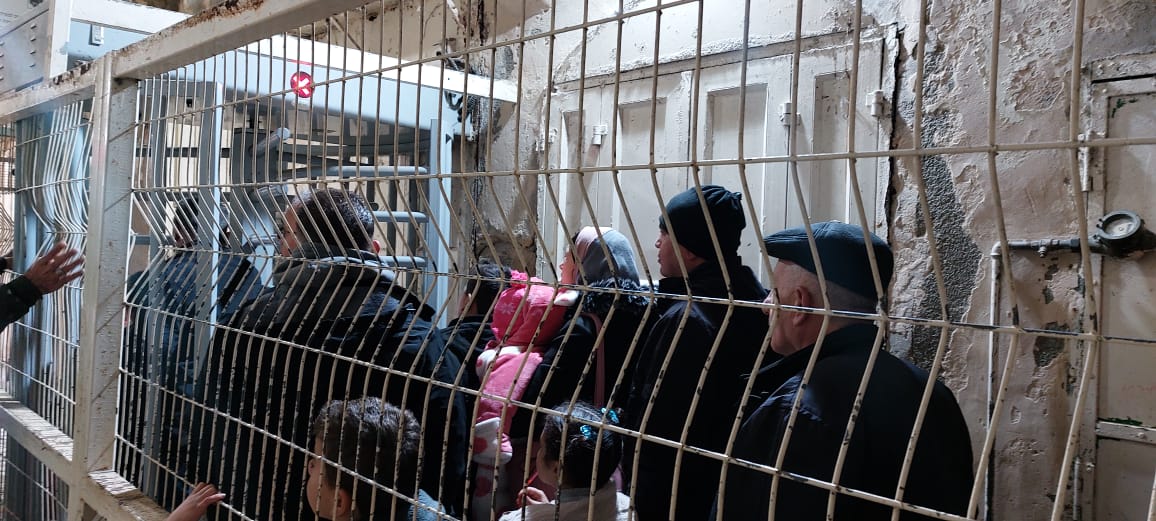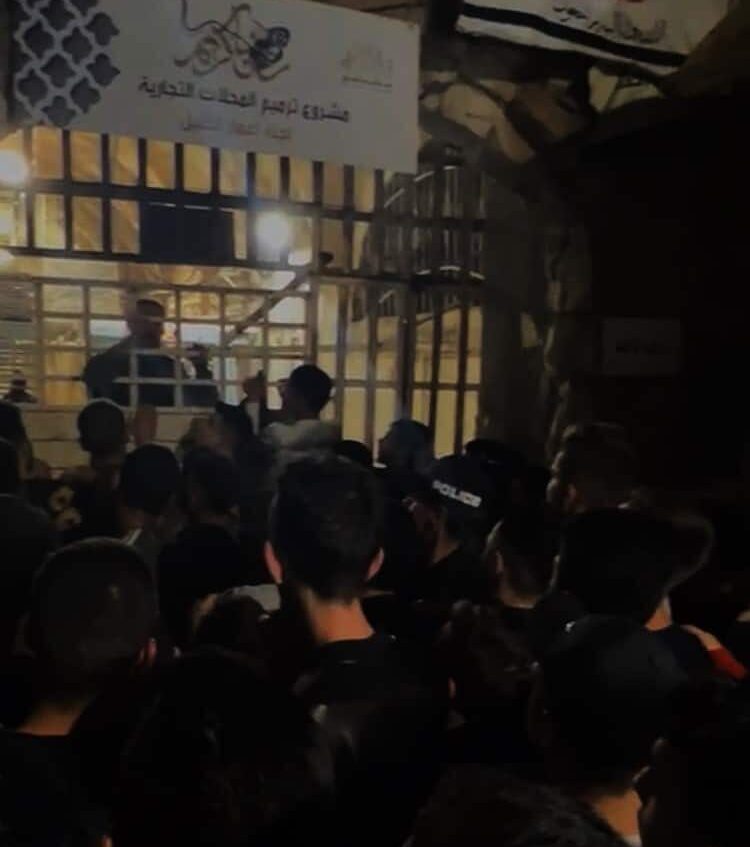‘I am scared every time I go through a checkpoint, but you cannot look nervous. If the soldier sees you’re nervous it is dangerous.’
Palestinian worshiper during Ramadan in Hebron
During the month of Ramadan in 1994, an Israeli settler named Baruch Goldstein, originally from the US, entered the Ibrahimi Mosque in Hebron and opened fire in the prayer hall. He killed 29 Palestinians and injured 125 more. Goldstein was killed at the scene. The violence continued as Israeli soldiers fired at Palestinians in the streets. A local woman shared with us that she lost two brothers that day, one in the mosque at the hands of Goldstein, and another on his way back from the hospital. Her elder brother was returning home in the afternoon having responded to a call for blood donations to save those injured during the massacre and was shot by an Israeli sniper. She recounted that the nurse could not believe her brother was dead when he arrived back at the hospital and kept repeating ‘he just donated blood.’
‘The initial response of the State of Israel and the IDF to [the Goldstein Massacre] was imposing limitations on the movement of the city’s Palestinian residents, due to fear of retaliation… From then and till today, the situation in Hebron has only declined: the movement restrictions that were applied in 1994 have been fortified and enhanced throughout the decades.’
Many families in Hebron have their own story from the Goldstein Massacre and share the memories of the loved ones they mourn. Locals say that almost 30-years on, these stories remain deeply in Hebron’s collective consciousness, making attending the mosque for Ramadan prayers an act of both worship and resistance.
Ramadan draws Palestinians to the mosque in substantial numbers. The site is a focal point in Hebron, a city which was listed as a UNESCO World Heritage Site owing in part to its beautiful limestone buildings dating as far back as the 13th century. The site marks the burial place of Abraham, Isaac, Jacob and Sarah and is a place of pilgrimage for Muslims; who know it as the Ibrahimi Mosque and Jews; who know it as the Cave of the Patriarchs.
In the wake of the 1994 massacre, the site was split into two; one side for Jewish worshipers and the other for Muslim worshipers. While Jews can freely access their entrance to the building, Muslims need to pass through an Israeli military checkpoint and a further dedicated secure entrance. The site lies in ‘H2’, an area of Hebron under full Israeli military control (you can learn more in this earlier eyewitness story).
‘Although this holy site is located in the Palestinian West Bank, Israel’s status as an occupier gives it ultimate authority over this site.’

Palestinians queue at the the Ibrahimi mosque checkpoint
On Friday 7 April 2023, with the midday sun burning in Hebron’s sky, thousands of worshipers poured into the Ibrahimi Mosque for Ramadan prayers. Volunteers in red and white jackets from the Palestine Red Crescent Society flanked the checkpoint gates, greeting Palestinians waiting in line to pass through the turnstiles. While queuing, worshipers discussed Israeli military raids on Al-Asqa Mosque that Wednesday 40-minutes away in East Jerusalem. Instagram videos (warning: distressing footage) of Israeli soldiers beating Palestinians with batons and stun grenades flashed on phones. The Red Crescent reported that 50 Palestinians had been injured. There was time to talk. The queue moved slowly. Israeli soldiers were checking IDs, conducting bag searches, and questioning worshipers about where they were from and if they had weapons. Contrastingly, Israeli settlers in the West Bank are legally allowed to carry firearms and armed settlers are a common sight in H2.
As people made it through the checkpoints, the mosque filled. Lacking space inside people began to file into the garden or lay their prayer mats on the black tarmac outside. Twenty-five Israeli soldiers in the mosque compound watched as Palestinians prayed. Two Israeli snipers on the rooftops pointed their guns in the direction of the worshipers below. The Imam’s call cried out over the speaker and worshipers bent to their knees, bowing their foreheads to touch the ground.
The night of power
In the last days of Ramadan, the tense militarised atmosphere around the mosque continued. Then on 17th April, the night of Laylat al- Qadr there came a bang and then another, and another.
Laylat al- Qadr, ‘the night of power’, is considered by Muslims to be the holiest night of Ramadan, the Islamic holy month of fasting. The night commemorates when the Quran was revealed to Prophet Muhammad. Every year, Muslims flock to mosques to pray throughout the night and into the early hours of the morning. This year in Hebron it was the same. Thousands came from all over Hebron and the wider West Bank to pray. A shopkeeper in Hebron’s old souk described how a night of prayer during Laylat al Qadr, is said to multiply your acts of prayer and kindness in the eyes of Allah.
From the evening, worshipers began to queue through the Israeli military checkpoints surrounding Ibrahimi Mosque. As during the Friday Prayers in the lead up to the night, Palestinians are asked if they are carrying any weapons, their bags searched, and IDs must be presented. A local described ‘I am scared every time I go through a checkpoint, but you cannot look nervous. If the soldier sees you’re nervous it is dangerous.’

Access to Ibrahimi Mosque blocked
The prayer was set to finish at around 3am. And so, worshipers were travelling from all over to Ibrahimi Mosque and arriving late into the evening, but at 9:30pm the gates of the checkpoint were closed by the military. Worshipers were told that they would not be able to enter on the holiest night of the year to pray. No reason was given. The crowd grew in the tunnels of the old souk leading to the checkpoint. People tried to negotiate with the soldier through the iron bars. Then bangs and flashes began. Israeli soldiers began to throw sound grenades, a tactic frequently use to disperse Palestinians and the crowd ran down the alleys away from the checkpoint and up through the souk.
‘The right to worship is both curtailed as a consequence of the obstruction of other essential rights, such as freedom of movement, while also representing a key manifestation of the Israeli state’s project of Judaisation, whereby non-Jewish histories and cultures are effaced.’
Israel’s repressive military actions on the night of Laylat al Qadr at Ibrahimi Mosque, alongside the severely violent raids on Al-Aqsa during the month of Ramadan are a flagrant violation of international law. As an occupying power, Israel has a responsibility to ensure the religion and religious practices of all citizens in the occupied territory are protected. Since the swearing in of Israel’s ultranationalist government earlier this year, there has been an intensification of attacks on the religious freedoms of Palestinian Muslims and Christians across the West Bank, including East Jerusalem.
Take action!
-
Use our quick template letter to send this eyewitness story to your elected representatives and faith leaders and ask them to speak out against Israel’s increasing discriminatory attacks on religious freedom. Ask them to call upon the Israeli government to protect the right to worship, in compliance with international law.
-
Part of a church or other faith community? Send them the Investing for Peace campaign postcard and ensure they are not investing in funds which profit from the occupation.
-
Watch and share the powerful short film by the New York Times, Mission Hebron, to hear directly from Israeli soldiers who have served in Hebron.

